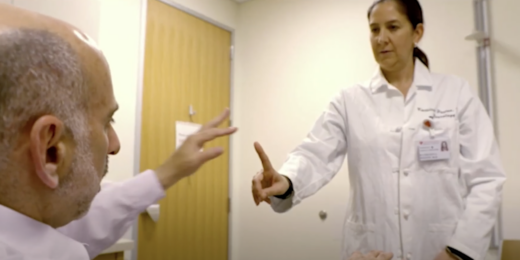Journalist Al Letson's work gives him a platform from which to probe some of the world's most difficult social issues: immigration, crime, drug abuse, justice, racism and more. In his line of work, he often has to quickly understand complex stories and relate to all types of people.
But after he accepted an invitation to speak at this year's Medicine and The Muse symposium, Letson, the award-winning radio host of Reveal, realized he didn't know what he might say to a gathering of medical students.
"I'm a poet, a journalist, an artist. And those things seem really different than the business, the practice of medicine," he said. But the experience of a friend who's navigating through a serious illness helped Letson realize there is a fundamental kinship between the two professions.
"There's one really basic thing that I do and that the medical profession has to do, and if we don't do it correctly, then we're not doing our jobs," said Letson. "And that is to be great listeners, to listen deeply, to hold people's stories."
His message resonated at the symposium, which featured thoughtful, funny, creative and poignant presentations of poetry, prose, music and research by medical students.
Audrey Shafer, MD, director of the Medicine & the Muse program, said that the opportunity to celebrate the talents of medical students from Stanford's School of Medicine serves to "build community, endorse inclusion, and honor empathy through the arts and humanities."

"Health humanities, if nothing else, strikes to the core of what matters in this world, reveals the very heart of the matter, and helps us hear that heartbeat, no matter how tremulous, no matter how strident," said Shafer, professor of anesthesiology, perioperative and pain medicine.
The program, she said, gives students a way to explore "the broader context of medicine, and how each and every one of us creates and discovers stories of health, illness, embodiment, mortality and health care."
Student performances included poetry about death, dying, bereavement and dementia by Dillon Stull, whose scholarship includes philosophy and theology. Paul Horak shared short stories about the aging population on the island of Shikoku in Japan. Jane Thomas juxtaposed photos and prose to discuss addiction and incarceration. And Natalia Birgisson, who plans to work in children's health and with families in the foster care system, read from a novel she's writing.

Letson performed "Second Planet From A Star," a poem about tennis star Venus Williams that helped launch him to slam poetry fame. Then he talked about learning, early in his career, that listening with more intention gave him a deeper understanding of the people whose stories he tells. That means listening, he said, "not just hear what they were saying, but feel what they were feeling, to go deeper, to go deeper within myself."
To illustrate his point, he talked about interactions his ill friend had with a couple of physicians that left him discouraged. The friend, he said, eventually found a physician who gives him and his wife time to discuss their emotions, hopes and goals.
"What he really wanted was somebody who'd listen, somebody to talk to, somebody that could make him feel like they were on a team and they were going to try to conquer this thing together," Letson said.
He encouraged the audience to follow suit: "Understand that everybody that comes into your door, everybody that sits across from me in an interview, has a story that is so important to them," he said. "And we live in a world where everybody wants to tell their story."

Photos by Yuan Zhang




